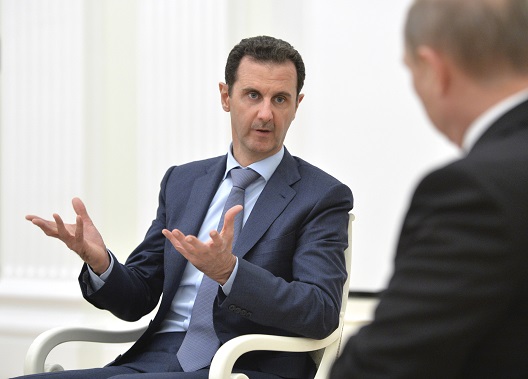 From the beginning of the Syrian crisis Washington and key GCC players have approached the problem with fundamentally differing priorities inspired by one key player: Iran. For Riyadh in particular, the salient feature of Syria’s agony and destruction has been Tehran’s aggressive, aggrandizing reach into the Arab world. For Washington, reaching a nuclear agreement with Iran trumped Tehran’s regional hegemony and muted its reaction to the murderous criminal excesses of the Bashar al-Assad regime. If nothing else the presence of ISIS (ISIL, Islamic State, Daesh) in Syria and the Assad regime’s role in sustaining it ought to get the United States and the GCC’s leading players on the same page in Syria.
From the beginning of the Syrian crisis Washington and key GCC players have approached the problem with fundamentally differing priorities inspired by one key player: Iran. For Riyadh in particular, the salient feature of Syria’s agony and destruction has been Tehran’s aggressive, aggrandizing reach into the Arab world. For Washington, reaching a nuclear agreement with Iran trumped Tehran’s regional hegemony and muted its reaction to the murderous criminal excesses of the Bashar al-Assad regime. If nothing else the presence of ISIS (ISIL, Islamic State, Daesh) in Syria and the Assad regime’s role in sustaining it ought to get the United States and the GCC’s leading players on the same page in Syria.
For the better part of five years differing approaches toward Iran have contributed mightily to the political survival of a mass murdering despot in western Syria and the related rise of a genocidal actor in the east. The Obama administration’s fear of offending Iran accounted in large measure for American inaction in the face of the Assad regime’s mass homicide and collective punishment. The largely sectarian and uniformly lethal response of the regime to an initially peaceful uprising created a legitimacy vacuum filled by an imposed ISIS presence in eastern Syria, one that mounted an invasion of Iraq in June 2014. Deference to Iran – which needs Assad’s support for Tehran’s Lebanese militia (Hezbollah), and which has militarily bolstered the regime through overtly sectarian means – helps account for the fact that the United States has protected not a single Syrian civilian from the regime’s campaign of human eradication: a campaign that has produced a humanitarian abomination, enormous burdens for Syria’s neighbors, political turmoil in Western Europe, and a recruiting bonanza for ISIS.
Regional actors reacted to the blatant sectarianism of Assad and Iran with sectarianism of their own in terms of armed groups supported in Syria. Private Gulf money helped put competing Al Qaeda organizations – ISIS and the Nusra Front – in business. Official funds have gone to other armed Syrian actors sporting sectarian political agendas. All of this money might as well have gone to Assad directly, because it has supported a key plank of his survival platform: his claim to minorities within Syria and to Europeans and North Americans that his is a fight against terrorism and political Islam. The refusal of Washington to take command of the arming and training of Syrian rebels early-on permitted and even encouraged regional actors to do their worst in terms of supporting people few Syrians would regard as respectable or worthy.
By focusing in their own contradictory ways on Iran, Washington and the GCC leaders largely ignored Syria and Syrians. This has had grave policy consequences, all of them unintended. The symbiotic Assad-ISIS relationship has destroyed the country and caused a significant part of the population to experience some or all of the following: death, severe injury, psychological trauma, displacement, disease, incarceration, starvation, sexual abuse, and terror. Neither Washington nor the Gulf caused any of this. Their Iran-inspired policy reactions simply made matters immeasurably worse.
Going forward, Washington and its GCC partners would do well to focus on Syria on its own merits. Protecting civilians and defeating ISIS are the keys to doing so.
Although Geneva peace negotiations merit support, progress toward a political solution must pass through one portal: protection of civilians. Whether Iran’s Supreme Leader or Russia’s President like it or not, their ability and that of their client to commit mass murder must be complicated and mitigated. Doing so does not require the invasion and occupation of Syria. Neither does it require innovation in terms of military science.
Beating ISIS in Syria will require a professional ground force to close with and kill it. It will require a stabilization plan enabling local councils (now underground) and the nationalist Syrian opposition to provide administrative services in areas liberated from ISIS. Waiting for more terrorist spectacles planned in Raqqa to unfold simply will not do.
These two pillars of strategy – civilian protection and killing ISIS – can put Syria on a pathway to political compromise, reconstruction, and reconciliation. Washington-GCC cooperation in creating this pathway is, thanks to destructively differing obsessions with Iran, painfully overdue. It should be delayed no further.
Frederic C. Hof is a Resident Senior Fellow with the Atlantic Council’s Rafik Hariri Center for the Middle East.
Image: Photo: Syrian President Bashar al-Assad speaks during a meeting with Russian President Vladimir Putin at the Kremlin in Moscow, Russia, October 20, 2015. Assad flew into Moscow on Tuesday for a meeting with Putin during which the two men discussed their joint military campaign against Islamist militants in Syria, a Kremlin spokesman said. Picture taken October 20, 2015
